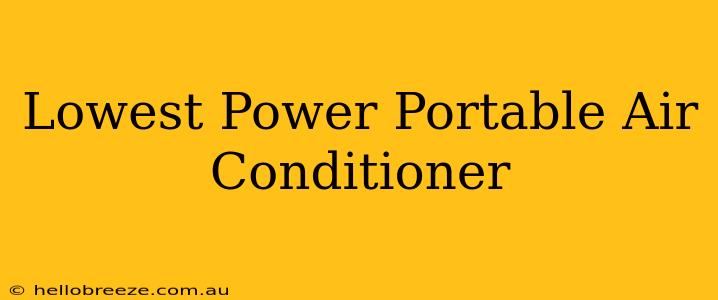Summer heat can be unbearable, but the high energy costs of traditional air conditioners can be just as stifling. Fortunately, a new generation of low power portable air conditioners offers a refreshing solution. These energy-efficient units let you beat the heat without significantly impacting your electricity bill. This guide explores the best options and factors to consider when choosing a low-power portable AC.
Understanding Energy Efficiency in Portable ACs
Before diving into specific models, it's crucial to understand what makes a portable AC energy-efficient. Key factors include:
-
Energy Star Rating: Look for the Energy Star certification. This indicates that the unit meets stringent energy-efficiency guidelines set by the government. The higher the rating, the better.
-
EER (Energy Efficiency Ratio): This rating measures the cooling output (in BTU/h) relative to the energy input (in watts). A higher EER signifies greater efficiency. Aim for a higher EER rating to minimize energy consumption.
-
BTU (British Thermal Units): This measures the cooling capacity of the unit. Choose a BTU rating appropriate for the size of the room you intend to cool. Oversizing a unit is inefficient, while undersizing can lead to inadequate cooling.
-
Power Consumption (Watts): This directly reflects the amount of electricity the unit consumes. Lower wattage indicates lower energy consumption.
Top Features to Consider in Low Power Portable Air Conditioners
Beyond energy efficiency, several features enhance the overall user experience and contribute to lower running costs:
-
Smart Features: Some models offer smart functionalities like app control, allowing you to remotely adjust settings and monitor energy usage. These features can contribute to more efficient cooling.
-
Multiple Cooling Modes: Look for units with options like fan-only mode or sleep mode, allowing you to customize cooling based on your needs and further reduce energy consumption when full cooling isn't required.
-
Dehumidification Function: Many low-power portable ACs also offer a dehumidification function, which is beneficial in humid climates and can help improve comfort even on less intensely hot days. This can reduce the need to run the AC at full power.
-
Quiet Operation: A quiet unit enhances comfort, making it suitable for bedrooms and other quiet spaces. Noisy operation might tempt you to leave the unit running less, thereby reducing cooling effectiveness.
Choosing the Right Size for Your Needs
Selecting the right BTU capacity is crucial for energy efficiency. An oversized unit will work harder than necessary, consuming more energy, while an undersized unit won't cool effectively, ultimately leading to higher energy bills due to prolonged operation. Consider these guidelines:
- Small Room (under 150 sq ft): 5,000-7,000 BTU
- Medium Room (150-300 sq ft): 7,000-10,000 BTU
- Large Room (over 300 sq ft): 10,000 BTU and above (Consider multiple units for optimal efficiency in very large spaces.)
Maintenance for Optimal Efficiency
Regular maintenance is crucial for maximizing the energy efficiency and longevity of your portable air conditioner:
- Clean the Filters Regularly: Clogged filters restrict airflow, forcing the unit to work harder. Clean or replace filters as recommended by the manufacturer.
- Check the Condenser Coil: Keep the condenser coil free of dust and debris. This improves heat dissipation and enhances cooling efficiency.
- Regular Servicing: Consult the manufacturer's instructions regarding professional servicing to ensure peak performance and longevity.
Conclusion: Finding Your Perfect Low-Power Portable AC
Investing in a low-power portable air conditioner is a smart choice for budget-conscious consumers and environmentally aware individuals. By carefully considering factors like EER rating, BTU capacity, wattage, and essential features, you can find the perfect unit to stay cool and comfortable without breaking the bank or significantly impacting your carbon footprint. Remember that proper sizing and regular maintenance are vital for maximizing energy savings.

